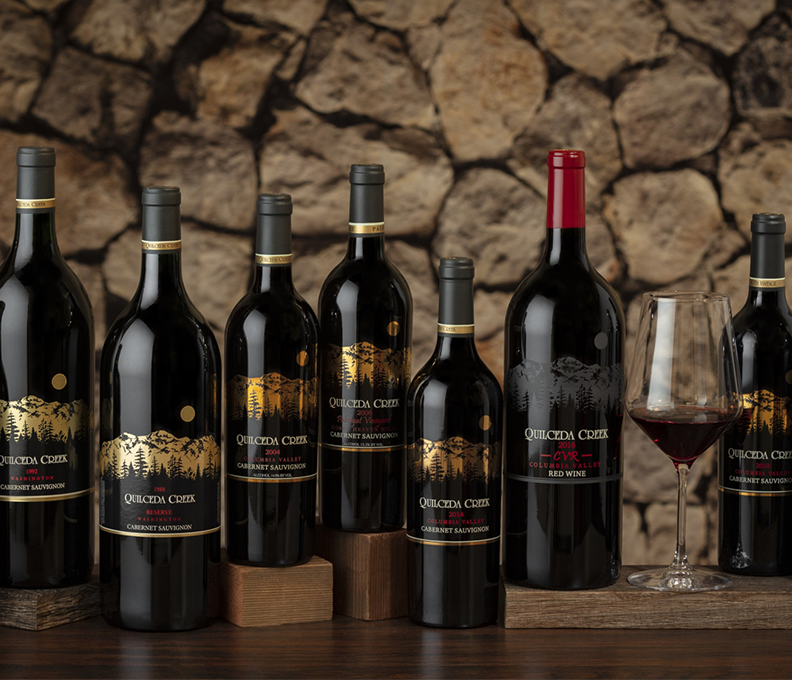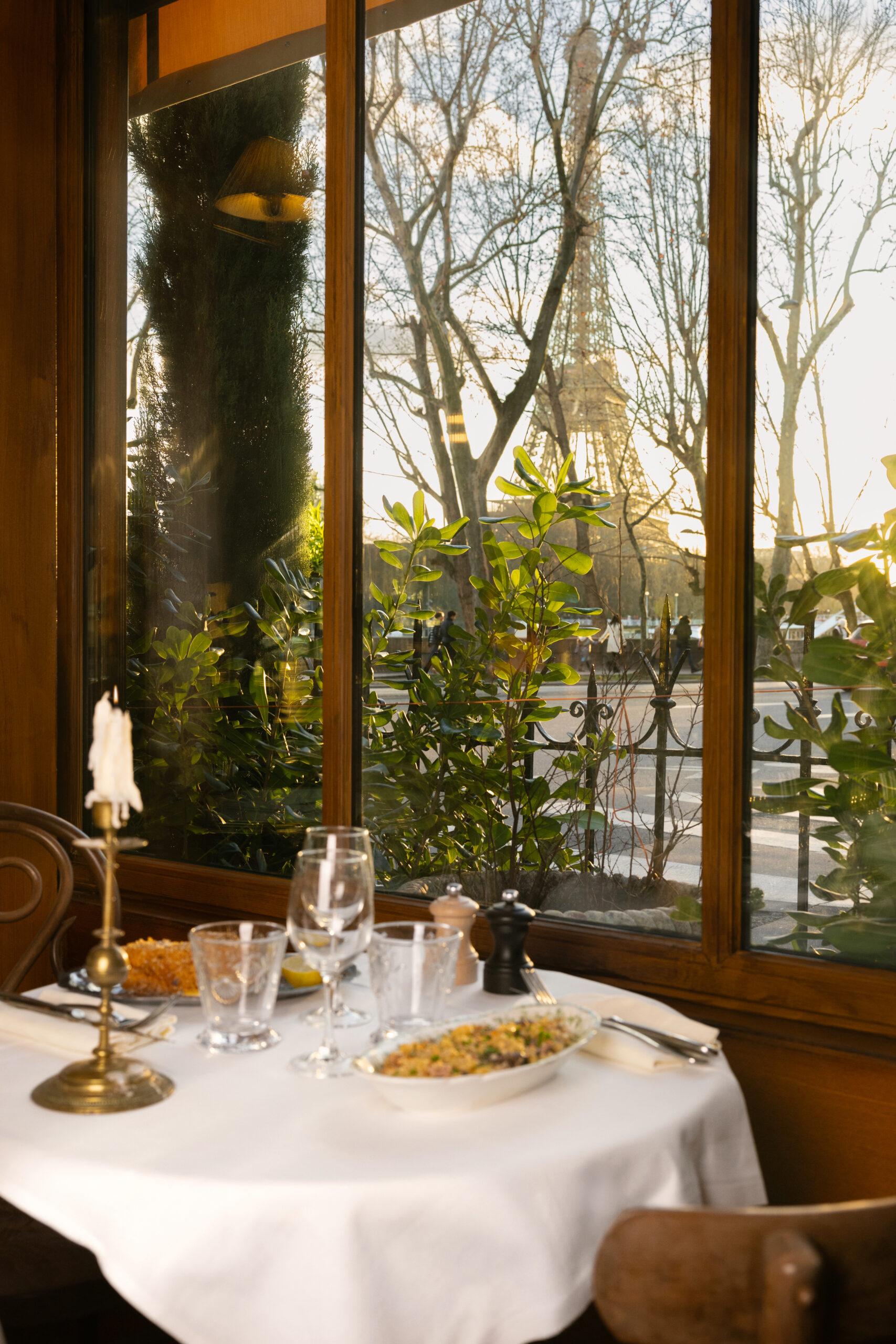Hotels Are Growing Their Own Produce for Cuisine and Amenities
On-site farms give properties a greater degree of control over their supply chains and the ability to better express a sense of place
by Todd Plummer
July 10, 2023
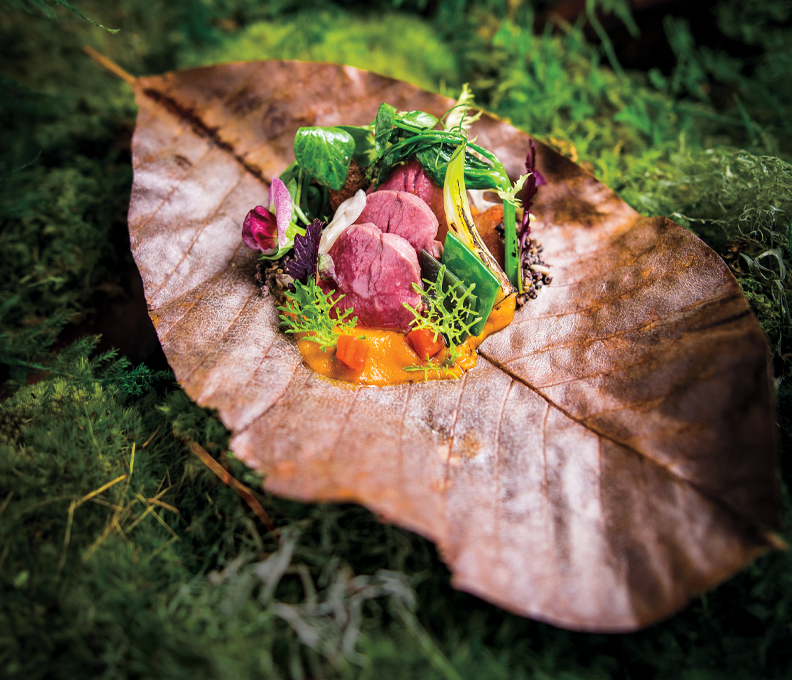
Venison hoba-yaki with carrot miso at SingleThread, Healdsburg, California / Photo: Courtesy of John Troxell
Days at SingleThread Farm in Healdsburg, California, begin before dawn, and decisions are made carefully. The farmers here typically get to work around 5 a.m., assessing the fields and gathering the morning’s bounty. One day, it could be petite summer squash with enormous blossoms attached. The next, it could be tomatoes, harvested on the exact day they reach peak ripeness and not a moment sooner. By 11 a.m., fully stocked farm trucks trundle their way down Dry Creek Road to downtown Healdsburg, just four miles away, where they will supply SingleThread’s restaurant and inn, a Relais & Chateaux.
“We are very fortunate that we live in Sonoma County where we can grow all year,” says head chef Kyle Connaughton. The proximity of SingleThread to its farm allows him to not only take advantage of California’s prime growing conditions, but also have precise control over what is served in his kitchens. Connaughton works in conjunction with his farmers for months or even a year in advance to grow the right varietals at the right time, in order to capture each product’s peak expression. SingleThread’s farm is able to meet 70 percent of the restaurant’s needs, with not only vegetables, herbs and fruit, but also flowers, honey and olive oil.
But with all that freedom and abundance comes obligation. “Our farmers work for months on a product and we serve it that night,” says Connaughton. “It’s our responsibility as chefs to showcase the hard work of the farmers.”
They seem to be doing just fine: The three-Michelin-star Japanese-inflected restaurant is one of the toughest and most satisfying tables to book in Sonoma County. And if you’re lucky enough to secure a guest room upstairs (there are only five), you’ll be treated to one of the most intimate hospitality experiences you’ll find anywhere, where every aspect of the food program integrates local ingredients. The inn’s aromatic and exquisite Périgord black-truffle omelet made with squash blossoms, eggs and tomatoes, for instance, is wheeled to the privacy of your room each morning. With the exception of the cheese (from Cowgirl Creamery, a vendor in neighboring Marin County), everything on that plate comes from SingleThread’s grounds. Sourcing locally is not a new concept, but more and more hotels such as SingleThread are taking to the concept to a whole new level by owning their own farms—even outside the idyllic growing conditions of California.
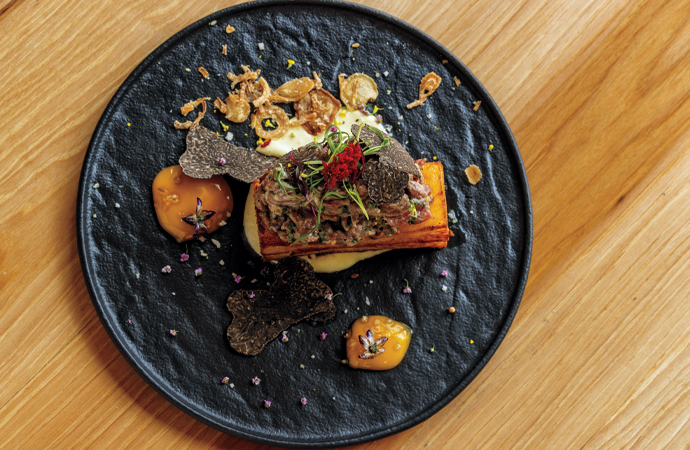
Steak tartare with Appalachian truffles and potato pavé at Nicewonder Farm & Vineyards, Bristol, Virginia / Photo: Courtesy of Nicewonder Farm & Vineyards
In the Northeast, where variable climates can make agriculture a challenge, hotels make the most of what they have. In North Hatley, Quebec, Manoir Hovey, another Relais & Chateaux property, sources as locally as possible, despite Eastern Canada’s relatively short growing season. The hotel grounds are a treasure trove of forageable wild mushrooms and herbs, and in early spring, birch trees are tapped for their sap to make syrup and vinegar. In the fertile American South, hotels like Nicewonder Farm & Vineyards in Bristol, Virginia, use their on-site farms to not only supply their kitchen, but also stock their farm stand with products that have enormous local character, such as hickory syrup and peony-blossom jam.
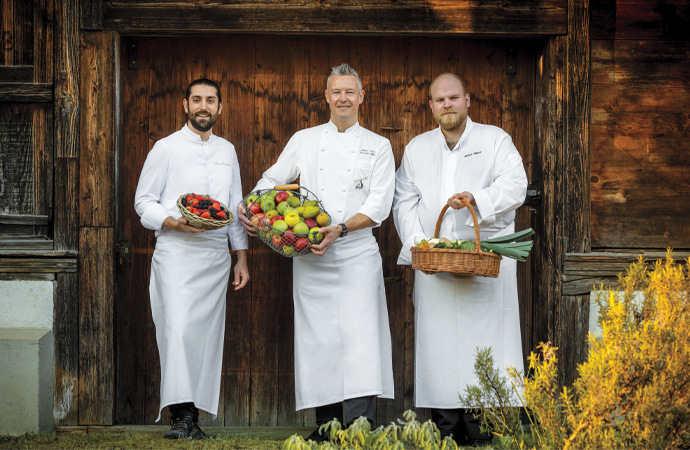
Pierre Cardona, Stefan Beer and Michael Althaus at Victoria-Jungfrau Grand Hotel & Spa, Interlaken, Switzerland / Photo: Courtesy of Tina Sturzenegger
When hotels are unable to grow their own food on-site, they often incorporate radius rules. The 1 Hotel Toronto’s downtown location might not be able to support on-site agriculture, but every ingredient on the menu at its 1 Kitchen comes from within 62 miles of central Toronto. While such restrictions might seem like a limitation, some chefs rise to the challenge, using it as an opportunity to discover all that the region has to offer. According to Stefan Beer, executive chef of the Victoria-Jungfrau Grand Hotel & Spa in Interlaken, Switzerland, everything his restaurant—aptly entitled Radius—needs can be found within 31 miles. “A large number of ingredients are of fantastic quality in this part of Switzerland,” he says. “All sorts of fish, poultry, pork, beef and of course milk products, but also caviar from Frutigen, saffron from Chrummbaum, duck from Einigen, and truffles from our own neighborhood.”
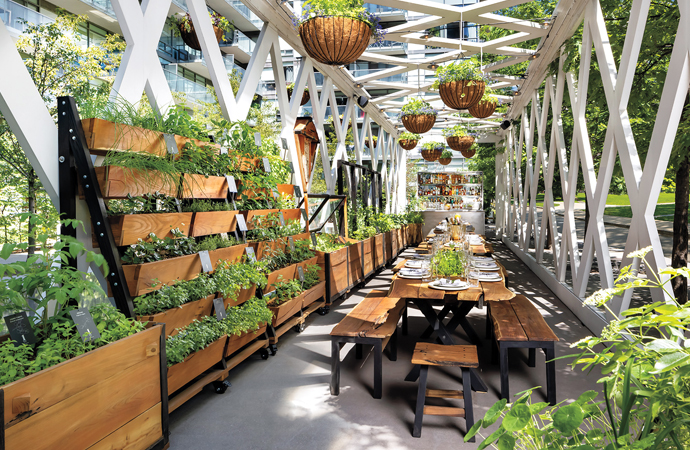
Garden pavilion at 1 Hotel Toronto / Photo: Courtesy of Brandon Barre Photography
And it’s not just independent and owner-operated hotels hopping on the trend: Large-scale players from megabrands like Marriott are investing in farms, too. At Grande Lakes Orlando, a resort development in Central Florida, the 7,000-square-foot Whisper Creek Farm exclusively serves neighboring Ritz-Carlton and J.W. Marriott hotels. Not only does this organic farm supply both hotels’ kitchens, but it also serves as seasonal inspiration for numerous amenities, such as peppermint mouth rinse, rosemary soaps, eucalyptus sugar scrubs, elderberry wellness shots and even a house hot sauce—all made with ingredients grown within throwing distance from the hotels’ lobbies.
While on-site farms and locavore sourcing policies allow hotels a greater degree of control over their supply chains and the ability to express a sense of place through cuisine and amenities, it’s important to not mistake on-site sourcing with true sustainability. Hotels operating their own farms is “largely symbolic,” according to Mark Bamford, Director of the Yale Sustainable Food Program. While there is a degree of prestige in touting local foods as not having been transported long distances and therefore not contributing to carbon emissions, says Bamford, transportation generally is not as much of a contributor to environmental degradation as, say, nitrous-oxide soil fluxes, “which are hugely important, but are difficult to see and experience in our daily life.”
The “food miles argument,” as Bamford calls it, is tangible and easy for a consumer to experience, a launching point from which to think about not where our food comes from, but how it comes. So the beauty of SingleThread’s truffle omelet has less to do with sourcing ingredients locally and more to do with changing the way people think about the human and environmental costs associated with getting something on their plate.
“If you feel comfortable that you know more about your food, that it’s consistent with your values and that it wasn’t done with great cruelty or harm, then that’s a good relationship with your food,” says Bamford. “Miles themselves aren’t a great indicator of that relationship, but if they start a conversation then I am all for it.”

